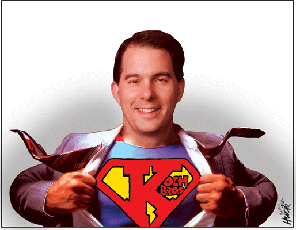
|
Governor Scott Walker of Wisconsin, when he launched an attack on public employees' bargaining rights in February 2011, provoked a mass movement in defense of workers' rights that spread across his state and across the country. UE members have been part of that resistance. Every UE local in Wisconsin sent members to Madison during the worker occupation of the state capitol, and UE locals across the country have taken part in "We Are One" protests and built links to the anti-corporate "Occupy" movement. This renewed momentum against corporate greed and for worker rights is growing, and it's not going away.
But for union members and all who are concerned about human rights in the United States, the results of the Wisconsin recall election on June 5 were a big disappointment and setback. Walker, who in the past 16 months has become the symbol of the attack on workers' rights, deserved and needed to be removed from office. The failure to recall Walker is a serious blow to labor which will embolden our enemies on the state and federal levels to launch more attacks on working people and unions. This will require us to work even harder to resist those attacks.
We need to recognize that Wisconsin workers did win a victory on Tuesday, June 5. Thanks in large part to the efforts of unions and their allies to mobilize urban voters, particularly African American voters in Milwaukee and Racine, the people of Racine successfully recalled a Republican state senator and thereby flipped majority control of the state senate from the Republicans to the Democrats. We hope that this win will prevent Walker from doing further legislative damage.
We also need to understand the reasons why the Wisconsin workers' movement, and the widespread sympathy for public workers that it evoked, did not result in Walker's defeat. The reasons include the corruption of the electoral system by unlimited corporate money, as well as the shortcomings of the Democrats.
Scott Walker amassed a campaign war chest of over $30 million - more than any candidate in Wisconsin history. Walker had about a 9 to 1 money advantage over his Democratic opponent, Milwaukee Mayor Tom Barrett, and while 34 percent of Barrett's money came from outside Wisconsin, Walker raised 67 percent of his money from out of state. The national corporate elite put up the money to save Scott Walker from the wrath of Wisconsinites. The result teaches us that, in wake of the U.S. Supreme Court's 2010 decision in the Citizens United case - which allowed unlimited corporate political spending - it will be much harder for labor and progressives to win electoral battles.
But the Democrats must bear significant blame for the failure to defeat Walker. President Obama has stayed out of Wisconsin since the labor rights battle started there last year, to avoid taking a stand on the issues involved. His administration and the national leadership of the Democratic Party said and did next to nothing to help labor and the Wisconsin Democrats in this fight. The Democratic National Committee refused to put any significant money into this fight, or to mobilize its national fundraising resources to help Wisconsin.
Obama is already paying a price for his inaction. Since the recall results, Wisconsin has moved from column of "safe" states for Obama's reelection, and political experts now consider it a "battleground" state in which he must spend money and time to prevent Romney from winning.
There were great weaknesses in Tom Barrett's campaign. He made no effort to appeal to the mass sympathy for public workers - the neighbors and acquaintances of most Wisconsinites - which had been stirred and mobilized last year. In the recall campaign neither Barrett, the Democratic Party, nor the unions spent time or campaign money making the case for collective bargaining rights and why it was necessary to remove Walker in order to restore fairness. Instead, Barrett ran a conventional Democratic campaign and allowed Walker to set the terms of the debate with his boast that he held down taxes.
Let's not forget the lessons of Ohio - a state with a less progressive political history than Wisconsin. There, last November, voters were given a straight choice to approve or reject union-busting legislation. By a 61-39 margin, they repealed the bill. This was the only time in U.S. history when the electorate of an entire state has voted directly on the question of whether workers should have union bargaining rights, and we won in a landslide.
Why did we win in Ohio but lose in Wisconsin? One reason was voter unfamiliarity and discomfort with the recall process. Exit polls in Wisconsin showed 60 percent of voters thought it was unfair to recall a public official who had not been charged with high crimes - a theme that had been hammered in Walker's ads, with no direct answer from the Democrats or labor. To vote to recall Walker, voters probably also had to believe that Barrett would be a substantially better governor. In Ohio, none of those complications were present.
The lessons of June 5 in Wisconsin are that the fight for justice and workers' rights will continue to be very hard, and it may get harder, but also that we can win and we can't quit. Mahlon Mitchell, the president of the Wisconsin statewide firefighters union and the Democratic nominee for lieutenant governor, managed to re-energize a depressed election-night gathering when he told them, "This is a fight we have to keep up. This is not just a movement, but a way of life. We got to keep together and keep going."
BRUCE J. KLIPPLE, General President
ANDREW DINKELAKER, General Secretary-Treasurer
ROBERT B. KINGSLEY, Director of Organization
